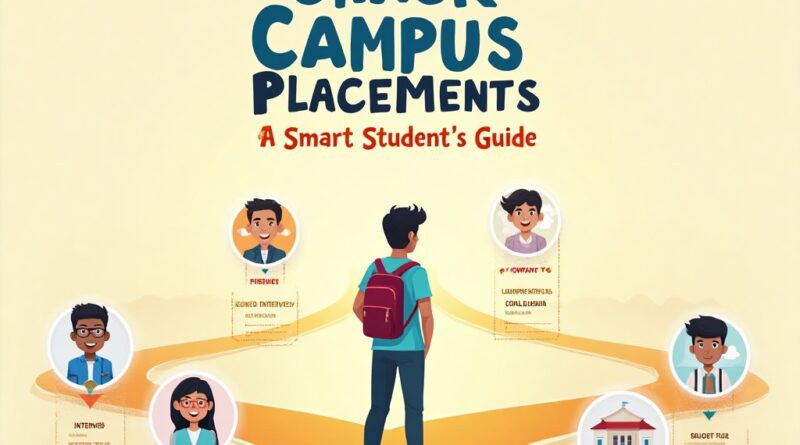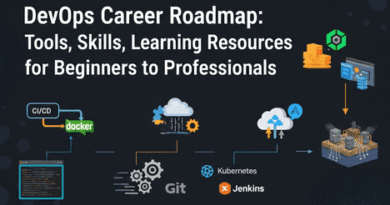How to Crack Campus Placements – A Smart Student’s Guide
🎯 How to crack Campus Placements: A Smart Student’s Guide 🚀
As an interviewer who has assessed hundreds of candidates from various colleges, I can confidently say this: The best candidate is not always the smartest one—but the best-prepared one. Whether you’re aiming for your dream IT company, a core engineering job, or a management trainee role, campus placements are your golden ticket to launch your career.
In this guide, I’ll walk you through everything you need to ace your campus placements—from aptitude to HR rounds, and everything in between.
🎓 What Are Campus Placements?
Campus placements, also known as campus recruitments, are hiring drives conducted by companies at colleges to select final-year students for various roles. There are two types:
-
On-campus: Companies come to your college to hire.
-
Off-campus: You apply outside your college (covered less here).
⭐ Why Are Campus Placements Important?
-
✅ Early Career Start: You land a job before graduating.
-
💰 Financial Independence: Start earning as soon as you finish college.
-
🌐 Industry Exposure: Connect directly with companies and recruiters.
-
🧠 Confidence Booster: Helps you understand real-world expectations.
- Motivates readers by showing the benefits of campus placements—financial, professional, and psychological.
-
Establishes the value of preparation, increasing the reader’s investment in the rest of the post.
Also Read,
Handle Interview Anxiety: Pro Tips from an Interviewer
Crack HR Rounds as a Fresher: Expert Tips from an Interviewer
🔍 Steps to Prepare for Campus Placements
1. 🧾 Build a Strong Resume (Your First Impression)
“Your resume should speak before you do.”
From an interviewer’s lens, a resume is the first filter. Here’s what to include:
-
✅ Clear Objective: Focused and personalized to your field (avoid generic statements).
-
📚 Academic Details: Include GPA, projects, and relevant coursework.
-
🛠️ Skills Section: List programming languages, tools, and soft skills.
-
📂 Internships & Projects: Briefly describe your contributions and impact.
-
🏅 Achievements & Certifications: Show your initiative and dedication.
Tips:
-
Keep it to one page if you’re a fresher.
-
Use active verbs like “developed,” “analyzed,” “implemented.”
2. 🧠 Master Aptitude Tests (The First Gatekeeper)
“Most candidates are eliminated in the aptitude round.”
Key Topics:
-
📊 Quantitative Aptitude (Time & Work, Speed & Distance, Probability)
-
📈 Logical Reasoning (Puzzles, Syllogisms, Data Interpretation)
-
📜 Verbal Ability (Reading comprehension, Sentence correction)
How to Prepare:
-
Use platforms like IndiaBix, PrepInsta, Testbook, or RS Aggarwal’s Quantitative Aptitude.
-
Practice with timed mock tests daily.
-
Focus on accuracy and speed—both matter.
3. 💬 Group Discussion (GD) – Speak to Be Heard
“We’re not just checking what you say, but how you say it.”
GD tests your communication, leadership, and teamwork. Companies often use it to filter candidates quickly.
Common GD Topics:
-
Social issues (e.g., “Is AI replacing humans?”)
-
Abstract topics (e.g., “Red is Red”)
-
Current affairs (e.g., “Impact of 5G in India”)
Tips to Win the GD:
-
Start or conclude the discussion if you can—those are high-impact spots.
-
Don’t dominate or interrupt rudely.
-
Back your points with examples and facts.
-
Maintain eye contact and be respectful.
4. 🧑💻 Sharpen Technical Knowledge (Your Domain Speaks)
“We look for depth, not just breadth.”
This round varies based on your branch:
-
CS/IT: DSA, DBMS, OOPs, Operating Systems, and basic coding
-
ECE/EEE: Circuit theory, Signal systems, Communication, etc.
-
Mechanical: Thermodynamics, Mechanics, Design
-
Others: Core subject fundamentals
Resources:
-
Use GeeksforGeeks, LeetCode, or HackerRank.
-
Revisit your academic projects—know your code and purpose inside out.
-
Be ready to write code on paper or online IDEs.
5. 🤝 Ace the Personal Interview (HR & Technical)
“We hire people, not robots. Show us who you are.”
Technical Interview:
-
Be honest—don’t bluff. It’s okay not to know everything.
-
Be ready for problem-solving questions and real-world scenarios.
-
Prepare for basic coding (even for non-CS branches).
HR Interview:
Expect questions like:
-
“Tell me about yourself.”
-
“Why should we hire you?”
-
“Where do you see yourself in 5 years?”
Golden Rules:
-
Smile and be confident.
-
Speak clearly and avoid filler words like “umm…”.
-
Maintain positive body language.
🧠 General Tips from an Interviewer
-
Mock Interviews: Do mock rounds with friends or mentors.
-
Know the Company: Read about the company’s products, values, and recent news.
-
Dress Formally: First impressions matter.
-
Keep Documents Ready: Resume, marksheets, certificates—organized and scanned.
-
Practice Elevator Pitch: Who are you? What have you done? What do you want?
🚫 Mistakes to Avoid
-
❌ Copying resumes from friends – You will get caught.
-
❌ Focusing only on coding – Soft skills matter too.
-
❌ Underestimating the aptitude round – It’s often the toughest filter.
-
❌ Ignoring your projects – Be ready to explain every line if asked.
-
❌ Memorizing HR answers – Keep it natural and honest.
💡 Final Thoughts
Campus placements are not about being the perfect candidate—they’re about showing that you’re trainable, passionate, and willing to learn. Prepare with consistency, not just intensity.
As an interviewer, I can tell when someone has done the work. I don’t look for geniuses—I look for someone who’s ready to grow.
So, take this guide, personalize your preparation, and go make your dream job a reality. 🚀
📤 Stay Updated with NextGen Careers Hub
📱 Follow us on Instagram
📺 Subscribe us on YouTube
Please share our website with others: NextGenCareersHub.in






Comments are closed.